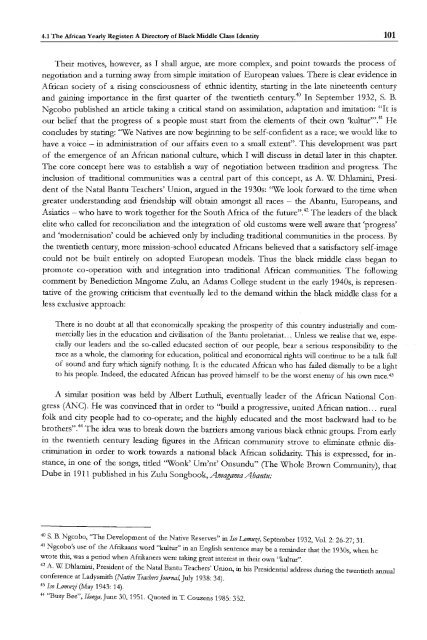South African Choral Music (Amakwaya): Song, Contest and the ...
South African Choral Music (Amakwaya): Song, Contest and the ...
South African Choral Music (Amakwaya): Song, Contest and the ...
You also want an ePaper? Increase the reach of your titles
YUMPU automatically turns print PDFs into web optimized ePapers that Google loves.
4.1 The <strong>African</strong> Yearly Register: A Directory ofBlack Middle Class Identity 101<br />
Their motives, however, as I shall argue, are more complex, <strong>and</strong> point towards <strong>the</strong> process of<br />
negotiation <strong>and</strong> a turning away from simple imitation of European values. There is clear evidence in<br />
<strong>African</strong> society of a rising consciousness of ethnic identity, starting in <strong>the</strong> late nineteenth century<br />
<strong>and</strong> gaining importance in <strong>the</strong> first quarter of <strong>the</strong> twentieth century.40 In September 1932, S. B.<br />
Ngcobo published an article taking a critical st<strong>and</strong> on assimilation, adaptation <strong>and</strong> imitation: "It is<br />
our belief that <strong>the</strong> progress of a people must start from <strong>the</strong> elements of <strong>the</strong>ir own 'kultur"'.41 He<br />
concludes by stating: 'We Natives are now beginning to be self-confident as a race; we would like to<br />
have a voice - in administration of our affairs even to a small extent". This development was part<br />
of <strong>the</strong> emergence of an <strong>African</strong> national culture, which I will discuss in detail later in this chapter.<br />
The core concept here was to establish a way of negotiation between tradition <strong>and</strong> progress. The<br />
inclusion of traditional communities was a central part of this concept, as A. W Dhlamini, President<br />
of <strong>the</strong> Natal Bantu Teachers' Union, argued in <strong>the</strong> 1930s: 'We look forward to <strong>the</strong> time when<br />
greater underst<strong>and</strong>ing <strong>and</strong> friendship will obtain amongst all races - <strong>the</strong> Abantu, Europeans, <strong>and</strong><br />
Asiatics - who have to work toge<strong>the</strong>r for <strong>the</strong> <strong>South</strong> Africa of <strong>the</strong> future".42 The leaders of <strong>the</strong> black<br />
elite who called for reconciliation <strong>and</strong> <strong>the</strong> integration of old customs were well aware that 'progress'<br />
<strong>and</strong> 'modernisation' could be achieved only by including traditional communities in <strong>the</strong> process. By<br />
<strong>the</strong> twentieth century, more mission-school educated <strong>African</strong>s believed that a satisfactory self-image<br />
could not be built entirely on adopted European models. Thus <strong>the</strong> black middle class began to<br />
promote co-operation with <strong>and</strong> integration into traditional <strong>African</strong> communities. The following<br />
comment by Benediction Mngome Zulu, an Adams College student in <strong>the</strong> early 1940s, is representative<br />
of <strong>the</strong> growing criticism that eventually led to <strong>the</strong> dem<strong>and</strong> within <strong>the</strong> black middle class for a<br />
less exclusive approach:<br />
There is no doubt at all that economically speaking <strong>the</strong> prosperity of this country industrially <strong>and</strong> commercially<br />
lies in <strong>the</strong> education <strong>and</strong> civilisation of <strong>the</strong> Bantu proletariat... Unless we realise that we, especially<br />
our leaders <strong>and</strong> <strong>the</strong> so-called educated section of our people, bear a serious responsibility to <strong>the</strong><br />
race as a whole, <strong>the</strong> clamoring for education, political <strong>and</strong> economical rights will continue to be a talk full<br />
of sound <strong>and</strong> fury which signify nothing. It is <strong>the</strong> educated <strong>African</strong> who has failed dismally to be a light<br />
to his people. Indeed, <strong>the</strong> educated <strong>African</strong> has proved himself to be <strong>the</strong> worst enemy of his own race.43<br />
A similar position was held by Albert Luthuli, eventually leader of <strong>the</strong> <strong>African</strong> National Congress<br />
CANC). He was convinced that in order to "build a progressive, united <strong>African</strong> nation... rural<br />
folk <strong>and</strong> city people had to co-operate; <strong>and</strong> <strong>the</strong> highly educated <strong>and</strong> <strong>the</strong> most backward had to be<br />
bro<strong>the</strong>rs".44 The idea was to break down <strong>the</strong> barriers among various black ethnic groups. From early<br />
in <strong>the</strong> twentieth century leading figures in <strong>the</strong> <strong>African</strong> community strove to eliminate ethnic discrimination<br />
in order to work towards a national black <strong>African</strong> solidarity. This is expressed, for instance,<br />
in one of <strong>the</strong> songs, titled 'Wonk' Um'nt' Onsundu" (The Whole Brown Community), that<br />
Dube in 1911 published in his Zulu <strong>Song</strong>book, Amagama Abantu:<br />
40 S. B. Ngcobo, "The Development of <strong>the</strong> Native Reserves" in Iso Lomuzi, September 1932, Vol. 2: 26-27; 31.<br />
41 Ngcobo's use of <strong>the</strong> Afrikaans word "kultur" in an English sentence may be a reminder that <strong>the</strong> 1930s, when he<br />
wrote this, was a period when Afrikaners were taking great interest in <strong>the</strong>ir own "kultur".<br />
42 A. W Dhlamini, President of <strong>the</strong> Natal Bantu Teachers' Union, in his Presidential address during <strong>the</strong> twentieth annual<br />
conference at Ladysmith (Native Teachers Journal, July 1938: 34).<br />
43 Iso Lomuzi (May 1943: 14).<br />
44 "Busy Bee", IIanga, June 30, 1951. Quoted in T. Couzens 1985: 352.

















